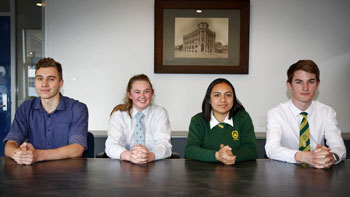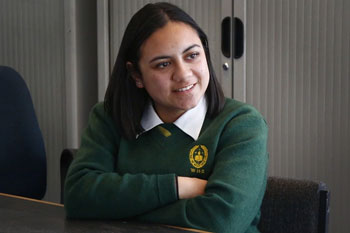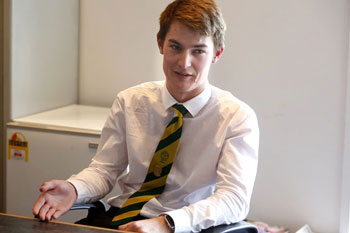Chronicle talks to young and old about voting

Some of Whanganui's youngest voters talk about what matters to them this election.
From left: Caius Wrigglesworth, Penny Lilburn, and WHS students' McKenzie Tunua and Jack Southee.
PHOTO'S/Bevan Conley
With the general election just two weeks away, reporter Anne-Marie Mcdonald speaks with some of Whanganui's youngest and oldest voters.
Caius Wrigglesworth, 19, Penny Lilburn, 18, McKenzie Tunua, 18, and Jack Southee, 18, will be voting for the first time at this election. Caius is a draughtsman, while Penny goes to Wanganui Collegiate, and Jack and McKenzie are students at Whanganui High School.
All four have enrolled to vote, and they intend to vote - but they haven't yet decided who to vote for.
So, as young people preparing to vote for the first time, what's important to them this election?
The environment and conservation stand out as major issues.
"I know there are a lot of other important issues like the economy and housing," Caius says. "But for me, at least, I feel like we're not paying much attention to conservation. We still have that idea in our heads that New Zealand is such a green country; but in reality, we're letting it go."

McKenzie agrees that conversation and environment are important, but likes aspects of both major parties' policies in this area.
Jack is also concerned about the environment. He's also interested in policies that have long-term benefits rather than short-term gain.
"I'm talking about things like climate change, and actually implementing things that will address that; also incarceration and rehabilitating people back into society. Obviously our current prison system isn't working because people are still committing crimes.
"There's been a lot of talk in this election about Labour raising taxes. But I think with a lot of the big issues, like roading, housing, the environment, there is an expectation that government will pay for these things because we all reap the benefits of them."
Home for Penny is a farm near Hunterville, so she is concerned about Labour's proposed tax on the use of water for commercial purposes.
"For people who use irrigation it could cost up to half of their annual income. I think Labour do have some good policies around the environment and conservation, but because of the water tax policy I couldn't see myself voting for Labour."
All four agree that voting is important.
"Whether you vote or not, everyone is affected by what the government does," Caius says. "So you might as well vote."
"I'm only 18 now, but by the time the next election comes around I'll be 21, and that's when government policies will really start to affect me," Penny says.
"I think older generations vote for what benefits them in the short-term," McKenzie says. "But people of our generation will be living with decisions made by the government for much longer."

Jack says while voting is important, many young people think their vote doesn't count.
"It's easy to think that you're just one vote, and that's really insignificant and won't change a thing. But the way I see it is that you can't complain about what the government is doing unless you vote."
But they admit a lot of their friends have no interest in politics.
"In my group of friends, there's two others who are interested," Penny says. "The rest are enrolled, but they're not interested, and they won't vote."
Caius thinks a lot of young people are apathetic because of the medium through which politics is presented.
"People of my age aren't going to watch the debates on television, or listen to the radio. They might see something on Facebook, but they're not going to click on the link to read it."
All four believe more needs to be done through schools to teach young people about politics and voting.
"I've really learned nothing at school," McKenzie says. "Everything I know about politics has come through my own research, or talking to people."
Jack believes politics should be a compulsory subject at school.
"Schools do implement compulsory subjects, so it could it done. I think it's what needs to happen. If it was an optional subject, only those who are already interested will take it."
All four are enthusiastic about Labour's plan to introduce civics and driver's licence classes in school.
"I really think this all needs to start at school. We need to look at how we are educating the next generation," Jack says.
By Anne-Marie McDonald
Wanganui Chronicle 9/9/17
